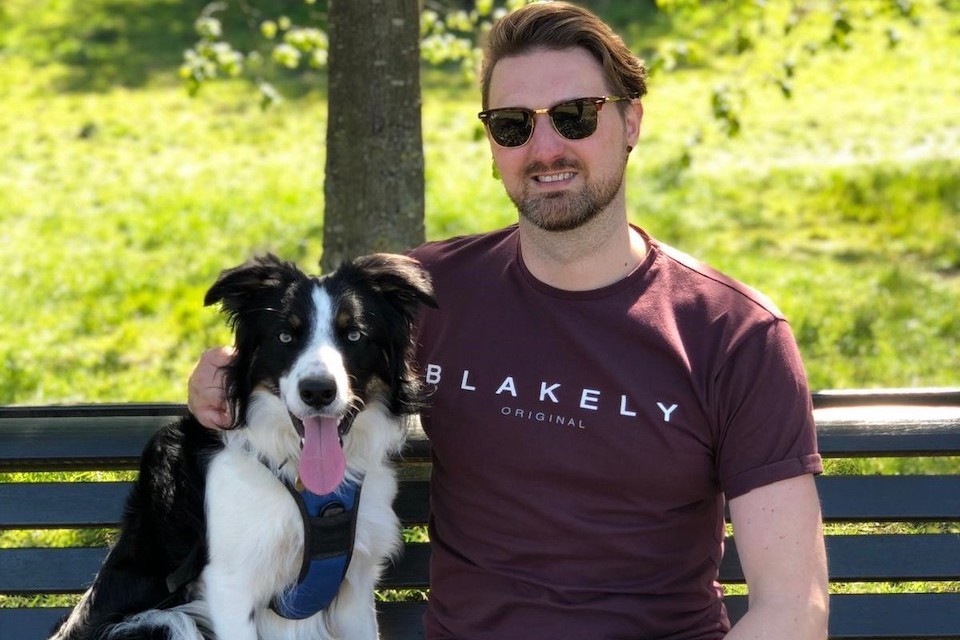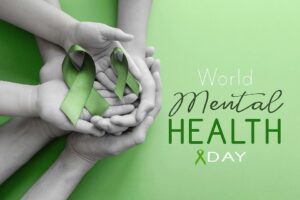
Losing a loved one is devastating, but what is the impact on our mental health? To mark World Mental Health Day, Chris Murray shares his experience. This blog is part five in our Bereavement and Loss series by Adam Land.
Birmingham, July 2018. I was on Mental Health First Aid Instructor training when my Dad rang. I knew something wasn’t right because it’s unusual for my family to ring during work hours unless it’s urgent. I took the call. My Dad said it was my Grandma.
Grandma had been in hospital for a few weeks and I’d travelled home to see her in June. She was in good spirits and nurses said she was improving; I was hopeful she’d soon be back home.
Life support
What Dad told me wasn’t good news. Grandma had taken a turn for the worse and been placed on life support. He said I needed to rush home to say my goodbyes. Naturally, I felt distraught.
Somehow, I steeled myself, gathered my belongings and travelled back to Middlesbrough. It felt like the longest journey of my life – and I’ve travelled around the world.

That evening, as I was driven to hospital, I started to feel sick. I will always remember two sets of double doors before the private room where my grandma had been moved. My heart raced; I felt unsteady, as if I might faint.
As I approached the ward, I had a panic attack. The overwhelming fear and pain was unbearable, knowing that once I went through those doors, it would be the last time I got to spend time with my Grandma.
My sister comforted me and helped me focus. I sat at Grandma’s bedside for a couple of hours, held her hand and talked to her. That took a lot of composure and I tried to reign in my emotions, desperate not to trigger everyone.
Struggled
The next morning, I was woken by my dad telling me Grandma had passed away. I expected the news, but it didn’t make the blow any easier. The loss of my Grandma, who I was very close to, was difficult to deal with and I struggled to find a purpose or reason to motivate myself.
The next day was my birthday, but it no longer held any importance. My sister arrived with my young nieces and nephew, bringing birthday cards and presents. There was a pile of cards to open – but I couldn’t summon up any interest. I had to get out of bed for my nephew and nieces as they didn’t understand, and were desperate for me to open the presents. Trying to smile for them and not get upset was extremely difficult. My mum handed me one of the birthday cards. It was from my Grandma.
 Mental health
Mental health
After losing my grandma, I started to struggle with my mental health. The loss made me reflect on the point of life, and how to deal with pain when you lose someone you cherish.
I felt pressure from all directions as I struggled to come to terms with my loss. I constantly experienced futile thoughts that I could and should have done more. It exacerbated my clinical depression, anxiety and OCD conditions, and I felt little value in anything I did for some time.
Help and support from medical professionals and spending time with family and friends helped me through a very tough period, and I started to focus on my wellbeing.
One thing that helped me was the fact that I had previously qualified as a Mental Health First Aider (MHFA) as I’d experienced first-hand the benefits of having someone willing to listen. Having trained as an MHFA at a two-day internationally recognised course hosted by Mental Health First Aid England, I learned to recognise the symptoms of mental health issues, provide initial help, and offer information to guide someone towards seeking professional help. Looking out for others helped me look out for myself.
The skills I had learned helped me find the strength to keep it together when I was struggling, and to understand how I was feeling and why.
There are over 2500 MHFAs across the Civil Service, and any civil servant can become one. An MHFA’s role is to regularly talk to colleagues who approach us for advice, and look out for people. It’s very rewarding, makes a significant difference to real people, and expands the vital support network available to all civil servants.
I find working as a Mental Health First Aid Instructor rewarding, and supporting others to become trained MHFAs makes a real difference, expanding the vital support network available to all civil servants.
Adam Land: I want to thank Chris for sharing his story. Chris said, “Sharing my story with others helped me feel like I had a purpose and what I was doing was important and by helping others, I was helping myself.”
CSHR has produced a series of resources, including a Guide for Managers to help support staff through Bereavement and Loss.
These are hosted on the Learning Platform for Government.
Mental Health First Aiders
We have Mental Health First Aiders in most departments in the Civil Service. If you can’t find one in your unit, please don’t hesitate to contact one in a nearby unit.
◼︎ Look out for the departmental First Aid notices
◼︎ The Mental Health First Aider tables on your departmental intranet will list all Mental Health First Aiders.

3 comments
Comment by Tracy Taplin posted on
In February last year the family got the devastating news that mum had got terminal cancer, in the March 2020 we went into lock down. From here on it was a constant battle with emotions, feelings and thoughts. Mum put up a very brave fight through chemo, and during the 18 months of treatment we could not hug her, we could not go in to see her but would wave through the front room window. Although mum was putting up this brave fight to stay with us a little longer, at times it felt like we had already lost her, really I have been grieving for 18 months.
I recognised I was having difficulties with my mental health last year and paid privately for counselling and got help through my GP.
I had feelings of hopelessness, although I was doing everything I could to help mum with getting medication, shopping and other things I felt totally hopeless and unable to help with the illness side of things. I also felt very angry, what are the chances of being diagnosed with terminal cancer and then going into a lock down, it felt like we had been robbed of the last bit of time we had left.
Mum passed away this year in July and I am still struggling now everyday with coming to terms with the loss. At the moment I can only see mum how she was at the end, the image of mum before her illness has gone in my head; I have to look at photos to remember her how she was.
I have found being back in work helps a little as I am distracted during the day. But when I am not distracted I have flash backs both during the day and in my dreams. The GP said it is trauma that is causing this.
I find it is good to talk to people about it, at the same time there are days where I find it hard.
Sorry to everyone on here for the loss of their loved ones.
Comment by Lorraine McBride posted on
Sorry for your loss, Tracy.
Comment by Gavin Thomas posted on
Thank you Adam for sharing with us your story. I am sorry for your loss.
Unfortunately, my father in law suddenly passed away last year. It was during the Covid-19 pandemic, so we had the additional challenges of the lockdown to deal with. In keeping with his religious beliefs, on behalf of his family I had viewed his final journey into the cremator.
As we approach the first anniversary of his passing, I am preparing myself, so that I will be able to support my wife and her family on what I am sure will be a difficult occasion for them.
We also lost our beloved dog a month ago. He was a rescued dog that we had brought back with us when we returned to the UK in 2014. He had been an integral part of our family unit, and had been my companion during the pandemic and I started working from home. His passing has left a hole on in daily life.
I would agree that it can be a struggle to come to terms with a loss of a family member, friend or even a pet, but it is important that reach out for help and support. Like you, I too am a trained Mental Health First Aider, and for once followed the advice that I was taught on the training course.